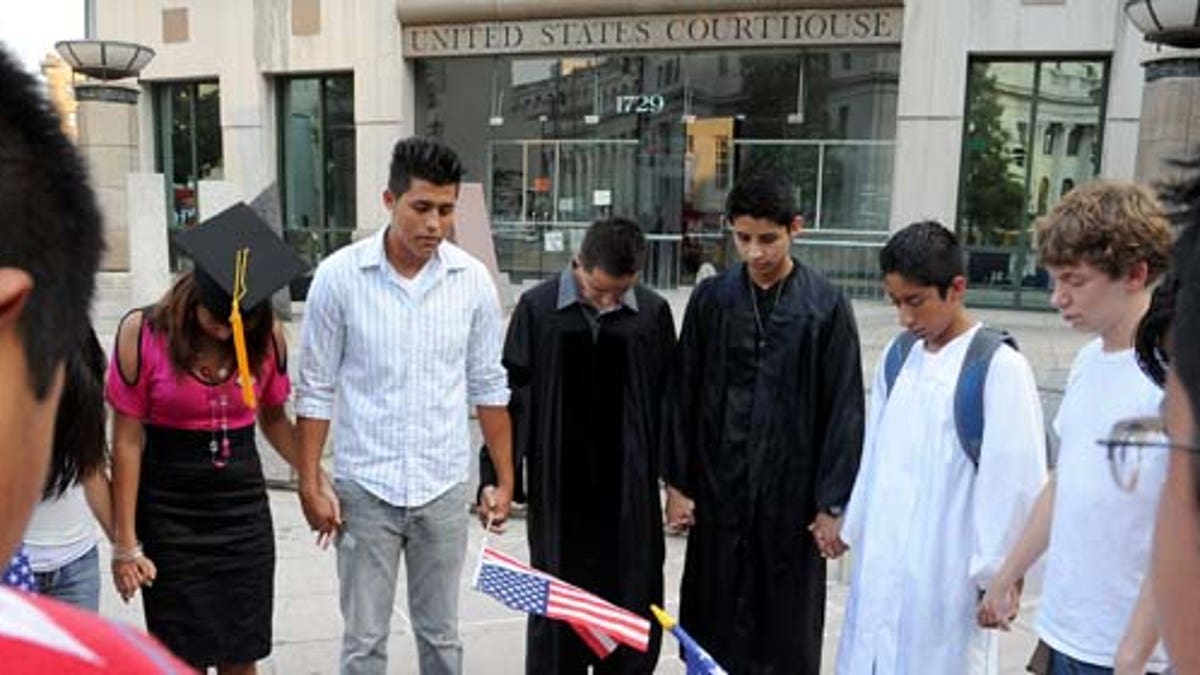
Protests have become a fixture in Alabama over the state's new, hard-line immigration law, considered the toughest in the country. (AP2011)
Groups that support giving undocumented immigrants a path to legalization are asking three major international automakers to join the fight for the repeal of Alabama's anti-illegal immigration law -- the toughest one in the country.
The opponents of the law want it to be repealed, not merely tweaked, as Alabama Gov. Robert Bentley and Republican legislators have described the coming modification of the measure.
Critics of the law, speaking in a telephone conference with reporters, said they had sent letters to Mercedes-Benz parent Daimler AG, Honda and Hyundai seeking meetings to discuss the law, parts of which have been put on hold by federal courts.
The president of the Washington-based Leadership Conference on Civil and Human Rights said opponents want the automotive companies to help them fight to overturn the law, which already has resulted in the brief detention of foreign employees from Mercedes and Honda.
"The truth is, there is no fix for (the law)," said Wade Henderson. "The only option that makes any sense -- and the only option that will help Alabama restore its reputation in the U.S. and with the international business community -- is for the Legislature to approve a complete repeal of this obnoxious law."
- Alabama Police Officers Cautious With New Immigration Law
- Controversial Immigration Laws Go into Effect Around the Country
- Alabama AG Calls for Changes to State Immigration Law
- Justice Department Sues Alabama Over Controversial Immigration Law
- Alabama Employer Bemoans Loss of Legal Workers Since Immigration Law Took Effect
A spokesman from Honda had no immediate comment, and a representative from Mercedes-Benz did not immediately return a message.
On Wednesday, the Services Employees International Union, or SEIU, plans to published what it described in an email as "open letter to the people of Alabama" about the law in a full page ad in Montgomery.
The ad is part of what the SEIU says is an effort to press foreign investors who have invested at least $50 million in the state to take a stand against the law, known as HB 56.
"Our initial focus is on the auto industry because it was at the forefront of rebuilding Alabama's economy after a concerted effort by the state to diminish its history of civil rights strife," said a statement on the union's website. "They are significant corporations who understand the significant harm that HB 56 can bring to the state and its workers."
Janet Murguia, president and chief executive of the National Council of La Raza, said Hyundai had agreed to a meeting, but company spokesman Robert Burns in Montgomery said he was unaware of such plans.
First sparked by Mercedes' decision to locate in Tuscaloosa County in 1993, Alabama's automotive industry is responsible for more than 48,000 jobs statewide, according to a trade association, and it has the capacity to produce more than 750,000 vehicles and engines annually.
Aside from appealing to car companies, activists also are planning demonstrations in Montgomery and to have participants in the annual re-enactment of the Selma-to-Montgomery voting rights march in a bid to build support for the repeal movement.
Republicans who overwhelmingly passed the law last year still control the Legislature and have said they'll kill any attempt to repeal the law or make major changes. Bentley has said he now favors minor amendments to the law, but he wants it to remain the nation's toughest.
Bentley is expected to discuss possible changes to the law during his address to lawmakers Tuesday night in Montgomery. Henderson declined comment on what might happen should the repeal effort fail, as GOP leaders say is guaranteed.
"We think legislators who examine this law closely ... will move to repeal the law," said Henderson.
Sections of the law took effect in late September despite court challenges, but judges blocked other parts in response to lawsuits by the Obama administration, immigrant rights groups, religious organizations and individuals.
The wide-ranging law requires police to determine citizenship status during traffic stops and bars government offices to verify legal residency for everyday transactions like obtaining a car license, enrolling a child in school, getting a job or renewing a business license.
Parts of the law that were placed on hold include a provision requiring schools to check the citizenship of new students and making it a crime to knowingly transport someone living in the country illegally.
Richard Cohen of the Southern Poverty Law Center, which is involved in the court fight to gut the law, said the Montgomery-based organization has received more than 5,100 calls to a hotline set up to take calls about problems with the law. Among the most recent complaints are allegations that children who are U.S. citizens are being denied food stamp benefits because their parents are undocumented immigrants, Cohen said.
Barry Spear, a spokesman with the Alabama Department of Human Resources, said such denials were not agency policy, and the department isn't aware of such violations.
This story contains material from The Associated Press.
Follow us on twitter.com/foxnewslatino
Like us at facebook.com/foxnewslatino




